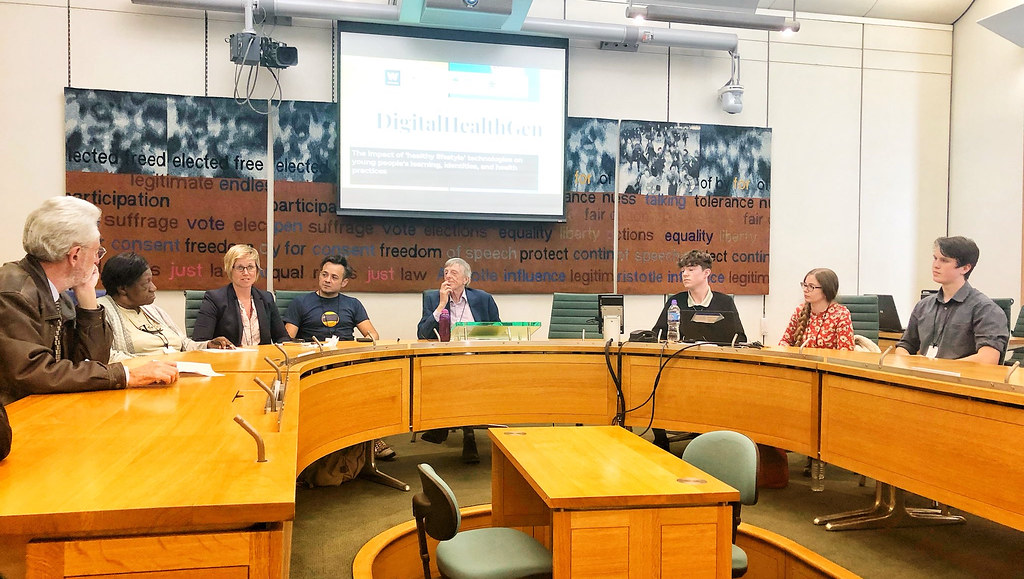A team from the universities of Bath and Salford presented preliminary findings from a new research project on young people and digital health at an event held in the House of Commons last week.
The policy event, hosted by Dr Lisa Cameron MP, was attended by researchers, young people, practitioners and policy-makers to give attendees an overview of the Wellcome Trust-funded project. This is focused on understanding how young people use digital platforms to engage with and make sense of their health.
It is part of a broader, collaborative research project led by Dr Emma Rich from our Department for Health, with Professor Andy Miah, University of Salford, Professor Deborah Lupton of University of Canberra, Australia and Dr Sarah Lewis, University of Bath.
The project aims to understand how young people are using digital health technologies; what they are learning; how they make sense of health information and data; and the impact of this on their identities and health behaviours.
Rapid growth in technologies
Over recent years there has been a rapid growth in technologies designed to promote healthy lifestyle behaviours, such as physical activity and body weight management, sleep and food consumption as well as other bodily aspects such as menstruation. Mobile and wearable devices offer a range of tools for individual to measure, monitor and regulate their health, and provide new ways of understanding our bodies and health through quantified data. Many of these technologies are now being promoted by schools, parents, coaches, health professionals and others as tools to encourage young people to adopt healthy lifestyles.
For the team involved in this project, however, there is a missing link.
They suggest research and policy development must be better informed by studies which truly understand the contexts in which digital health is used and address some of the ethical questions about the increased monitoring and surveillance of people’s bodies, addressing pressing issues concerning data privacy and safety. By working with GlobalNet 21, a leading platform in the UK for discussing major issues of the 21st century, they hope to bring this matter onto the agenda of policy-makers working in this area.
Speaking after the event Dr Emma Rich from the Department for Heath at the University said: “It is often assumed that young people are digital natives, but generation Z will need as much support as most of us in remaining digitally literate across their lives. The expansion of digital health technologies has happened at a rapid pace. With so much digital content available, young people are particularly concerned about what might be ‘safe’ knowledge when it comes to learning about healthy lifestyles. We want to ensure they can contribute to policy, as it develops.
“It’s really important that we identify opportunities but also the inequalities, disparites and risks associated with the use of mobile apps, wearable technologies and social media. Inequalities associated with resources, access, digital literacy, knowledge and understanding, culture, family engagement are factors which might shape young people’s engagement. As health care systems increasingly turn towards digital solutions, we need to be mindful of who might be excluded in these new terrains of healthcare’.
Insights to help professionals
Through this project the team have developed unique and usable insights for health professionals and policy-makers to enable them to develop safe and targeted digital policies and interventions.
Their research with young people has examined in detail how they establish trust and reliability in these environments, which platforms and devices young people prefer to use, how they use data generated by digital health technologies and what they understand about data privacy and safety. The research is also focused on understanding how practices such as tracking and monitoring health actually affects young people and their health behaviours. A current focus is on the social and ethical issues associated with the integration of artificial intelligence (AI) into healthcare.
Professor Andy Miah of the University of Salford added: “Over the last five years, we have seen health make huge steps through the integration of innovative digital platforms. With the rise of AI and the expansion of the mobile health app world, it’s crucial that young people have a voice here.”
“Working with policy-makers is crucial at this point in our technological history. With anxieties around AI running out of control, ensuring health care remains human is really important to our young participants.”
The event included a panel discussion with two young users of digital technologies, Alex Jelbert and Jack Bardzil, who have been involved with the project.
The event involved contributors from NHS Digital, the research team, and participants in the study. Hazel Jones, Apps / Wearable Programme Director for NHS Digital added: “It was a great opportunity for our NHS Apps Assessment and Uptake programme team to join in the debate at the House of Commons with Dr Emma Rich and Professor Andy Miah. With over 170,000 health and wellbeing apps available and growing, the NHS are working towards building a clear set of national standards and frameworks for health digital tools.
“Being able to share and learn more about how young people use digital technologies to help with their health and wellbeing concerns will help us to continually refine our thinking and current implementation strategy. A key learning in listening to the great young ambassadors from the debate was the huge role that vloggers play in this area. It was also a fantastic opportunity to hear directly from the public; their enthusiasm about what we are doing really inspired the whole team.”

